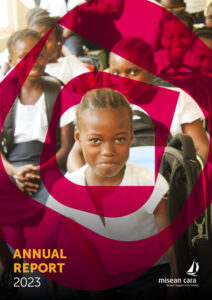In 2023, Misean Cara supported our members with more than €4.8m in funding for education projects in areas including:
€1,394,295
Primary Education & Equivalent for Adults
€1,142,258
Basic Life Skills for Youth & Adults
€668,741
Technical & Vocational
Education & Training
€784,978
Secondary Education
€645,742
Early Childhood Care
& Education
Education - especially for girls - is vital in the developing world. A child born to a mother who can read is 50% more likely to survive past the age of five.*
It’s an undeniable fact that education opens doors for people whose options in life might otherwise be far more limited.
However, unlocking potential doesn’t only benefit the person who has been educated. Better employment prospects and a greater awareness of rights and opportunities can also assist other family members and the wider community.
Worldwide, Misean Cara members place a special emphasis on supporting quality education, particularly the education of vulnerable girls in developing countries. Without essential skills such as reading and writing, and training in vocational and workplace skills, girls in many countries are at high risk of early marriage and pregnancy. Education develops their confidence, independence and decision-making skills. In short, it transforms lives.
In 2023 alone, we supplied funding of €4.8m to 95 member education projects. These projects targeted 166,472 people, and across all levels of education, more than 50% of project participants in 2023 were girls.
TANZANIA:
Providing quality education for orphans and street children in Dar es Salaam
On the outskirts of Dar es Salaam, Tanzania, many poor children in the Mbagala district have never been to school. Some are orphans from the HIV and AIDS epidemic, others are homeless street children, still others have been pushed into early employment.
To bring hope of a more secure future, the La Sainte Union Sisters run an accelerated learning programme for children who are out of school. This aims to help them access state-run public schools where they can continue their education and grow into confident adults who make a positive contribution to society.
When students enter the Complementary Basic Education in Tanzania (COBET) project they have many things in common: few have ever been to school; all are over the age of 10 with maths and literacy skills that are below pre-school level; poor discipline and low self-esteem are also the norm.
In their first year, students learn basic literacy and numeracy skills. They move on in their second year to study Maths, Science, English and literacy in the local Kiswahili language. To help the students overcome significant behavioural challenges and gaps in general knowledge outside of school, teaching life skills is also an important part of the curriculum.
More than 1000 children and young people have now come through the project. All moved on to local primary schools and passed state exams, with results that regularly exceed those of the other students. Some even graduate from university and return to inspire younger students.
The school has now been selected as a centre of excellence. This is further testament to the quality of the education being provided and how modern missionary-led development and education can transform lives.
Learn more about Misean Cara’s impact and commitment to Upholding the Right to Quality Education in 2023, on pages 17-18 of our 2023 Annual Report.
